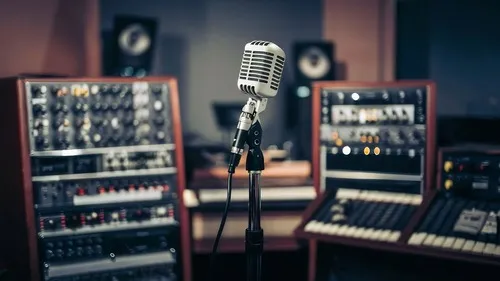Cipta Voiceover realistik secara dalam talian! Masukkan sebarang teks untuk menjana ucapan dan muat turun audio dalam format mp3 atau wav untuk sebarang tujuan. Sebut teks dengan suara yang dikuasakan oleh AI.Anda boleh menukar teks kepada suara secara percuma untuk rujukan sahaja. Untuk semua ciri, langgan pelan berbayar
Contoh suara AI
 Osman
Osman
 Yasmin
Yasmin
 Ada MY
Ada MY
 Adam MY
Adam MY
 Alessio MY
Alessio MY
 Alloy MY
Alloy MY
 Amanda MY
Amanda MY
 Andrew MY
Andrew MY
 Arabella MY
Arabella MY
 Ava MY
Ava MY
Bagaimana untuk menukar teks kepada suara?
- Cuma taip teks atau import kandungan tulisan anda
- Tekan butang "Jana"
- Muat turun MP3 / WAV
Senarai penuh kelebihan suara neural
Penyunting pelbagai suara
Dialog dengan Suara AI. Anda boleh menggunakan beberapa suara serentak dalam satu teks.

Lebih daripada 1000 Suara Semulajadi
Suara jernih seperti Manusia. Suara lelaki, wanita, kanak-kanak, dan orang tua.
Jimatan kos
Anda hanya membelanjakan sedikit untuk membuat dubbing semula teks. Limits hanya digunakan untuk ayat yang diubah dalam teks. Ketahui lebih lanjut tentang Sistem Limit kami yang menjimatkan kos. Nikmati kawalan penuh ke atas perbelanjaan anda dengan pembayaran sekali sahaja untuk apa yang anda gunakan. Bayar hanya apabila diperlukan: dapatkan akses fleksibel dan kos efektif kepada perkhidmatan voiceover neural kami tanpa langganan.

Teks panjang
Jika baki Limit anda mencukupi, anda boleh menukar teks sehingga 2,000,000 aksara ke suara dalam satu permintaan.

Kegunaan Komersial
Anda boleh menggunakan audio yang dijana untuk tujuan komersial. Contoh: YouTube, TikTok, Instagram, Facebook, Twitch, Twitter, Podcast, Iklan Video, E-buku, Pembentangan dan lain-lain.

Tetapan suara khusus
Ubah kelajuan, pitch, tekanan, sebutan, Intonasi, Penekanan, Jeda dan banyak lagi. Sokongan SSML.

SRT ke audio
Teks Sarikata ke Audio: Tukarkan fail teks sarikata anda ke voiceover berbilang bahasa yang disinkronkan dengan teknologi neural kami yang maju.

Muat turun TTS
Anda boleh memuat turun fail audio yang telah ditukar dalam format MP3, WAV, OGG secara percuma.

Sokongan kuat
Kami akan bantu anda dengan sebarang pertanyaan mengenai teks kepada suara. Tanya apa-apa sahaja, walau yang paling mudah sekalipun. Kami gembira untuk membantu.

Serasi dengan program penyuntingan
Berfungsi dengan semua perisian penciptaan video: Adobe Premier, After Effects, Audition, DaVinci Resolve, Apple Motion, Camtasia, iMovie, Audacity, dsb.

Cloud menyimpan sejarah anda
Semua fail dan teks anda disimpan secara automatik di profil anda di server cloud kami. Tambah trek kepada kegemaran dengan satu klik.

Gunakan penukar teks ke suara kami untuk mencipta video dengan suara semula jadi!
Katakan selamat tinggal kepada
penciptaan audio cara tradisional yang mahal
Harga murah. Hasilkan voiceover profesional dalam masa nyata dengan kos rendah. Ia 100 kali lebih murah daripada seorang pembaca suara secara langsung.
Penciptaan audio tradisional

- Pengumuman suara secara langsung yang mahal,
harga tinggi - Pencarian freelancer dan studio yang memakan masa
- Penyuntingan memerlukan alat yang kompleks dan kemahiran
- Pengumuman suara di studio mengambil masa lama. Memerlukan masa untuk memberi tugasan dan menerimanya.
SpeechGen

- Penjanaan TTS mampu milik bermula dari $0.08 untuk 1000 aksara
- Laman web boleh diakses dari pelayar anda sekarang juga
- Antaramuka intuitif, sesuai untuk pemula
- SpeechGen menukarkan teks kepada suara dengan sangat cepat. Beberapa klik sahaja diperlukan untuk menghasilkan audio.
Cipta voice-over realistik yang dijana oleh AI.
Penggunaan. Contoh Kes.
Lihat bagaimana orang lain sudah menggunakan teknologi sintesis suara kami yang realistik. Terdapat ratusan variasi aplikasi. Berikut adalah beberapa daripadanya.
- Voice-over untuk video. Komersial, YouTube, TikTok, Instagram, Facebook, dan media sosial lain. Tambahkan suara pada apa-apa video!
- Bahan pembelajaran elektronik. Contoh: belajar bahasa asing, mendengar kuliah, video panduan.
- Iklan. Tingkatkan pemasangan dan penjualan! Cipta voice-over realistik yang dijana oleh AI untuk iklan video, promosi, dan kreatif.
- Tempat awam. Sintesis suara daripada teks diperlukan di lapangan terbang, stesen bas, taman, pasar raya, stadium, dan kawasan awam lain.
- Podcast. Tukarkan teks menjadi podcast untuk meningkatkan capaian kandungan. Terbitkan fail audio anda di iTunes, Spotify, dan perkhidmatan podcast lain.
- Aplikasi mudah alih dan perisian komputer. Suara AI yang disintesis menjadikan aplikasi lebih mesra pengguna.
- Pembaca esei. Bacakan esei anda secara lantang untuk menulis esei yang lebih baik.
- Pembentangan. Gunakan teks kepada suara untuk pembentangan PowerPoint dan tayangan slaid yang mengesankan.
- Membaca dokumen. Jimatkan masa anda membaca dokumen dengan synthesizer suara.
- Pembaca buku. Gunakan aplikasi web teks kepada suara kami untuk membaca buku secara lantang dengan suara semulajadi.
- Pesanan audio alu-aluan untuk laman web. Cara yang sempurna untuk menarik kembali perhatian audiens anda.
- Pembaca artikel dalam talian. Pengguna internet menukar teks artikel yang menarik ke dalam audio dan mendengarnya untuk menjimatkan masa.
- Penjana ucapan ucapan telefon. Rakam suara untuk sistem telefon dengan salam telefon yang profesional.
- Pencerita dalam talian untuk membacakan cerita dongeng kepada anak-anak.
- Untuk keseronokan. Gunakan voiceover robotik untuk mencipta meme, kreatif, dan gurauan.
Maksimumkan potensi kandungan anda dengan versi audio. Tingkatkan penglibatan audiens dan pacu pertumbuhan perniagaan.
Siapa yang menggunakan Teks kepada Suara?
SpeechGen.io adalah perkhidmatan bertenaga kecerdasan buatan yang digunakan oleh sekitar 1,000 orang setiap hari untuk pelbagai tujuan. Berikut adalah contohnya.
Pembuat video menghasilkan voiceover untuk video. Mereka mencipta kandungan audio tanpa pengeluaran studio yang mahal.
Pemberita berita menukar teks kepada suara dengan suara komputer untuk laporan berita dan pengumuman sukan.
Pelajar dan profesional sibuk untuk meneroka kandungan dengan cepat.
Pengguna asing. Pelajar bahasa kedua yang ingin meningkatkan sebutan atau mendengar pemahaman teks.
Pembangun perisian menambah suara yang disintesis ke dalam program untuk memperbaiki pengalaman pengguna.
Pemasar. Kandungan audio mudah dihasilkan untuk sebarang syarikat baru.
Rekod suara IVR. Hasilkan arahan untuk sistem tindak balas suara interaktif.
Pendidik. Guru bahasa asing mencipta suara daripada teks untuk contoh audio.
Peminat buku menggunakan Speechgen sebagai pembaca buku dengan suara kuat. Suara voiceover TTS boleh dimuat turun. Dengarkan di mana-mana peranti.
Bahagian HR dan profesional pembelajaran elektronik boleh membuat modul pembelajaran serta latihan pekerja dengan perisian teks kepada suara dalam talian AI.
Webmaster menukar artikel kepada audio dengan suara robot yang serupa dengan manusia. Audio TTS meningkatkan masa di halaman web dan mendalamkan jumlah tontonan.
Animator menggunakan suara AI untuk dialog dan ucapan watak.
Teknologi Teks kepada Suara membolehkan jenama, syarikat, dan organisasi menyampaikan pengalaman pengguna yang lebih baik sambil mengurangkan kos.
Soalan Lazim
Tukar sebarang teks kepada suara manusia super realistik. Lihat semua pelan tarif.
 SpeechGen.io
SpeechGen.io